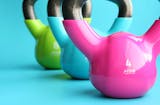Q. Will Protein Shakes Help Me Build Muscles While Weight Training?
A. The notion held by many bodybuilders that you need to consume tons of protein to build muscle is a myth.
A dozen eggs and a steak for breakfast are likely to give you a heart attack rather than a muscled body. With extremely hard training, the maximum amount of muscle you can put on in a year is 8lb (3.6kg), no matter how much protein you eat. That represents a gain of 2.5oz (71g) each week, or 0.3oz (9.5g) a day. Muscle is only 22 per cent protein, so an increased consumption of less than a tenth of an ounce, or 2.8g a day — equivalent to a quarter of a teaspoonful — is all you need to gain the maximum bulk of muscles!
So, instead of cramming in unnecessary protein, which taxes the body more than it helps it, follow the rules of moderation to make proper use of the protein in your diet. Eat fish as well as good quality meat, and make sure some of your protein comes from vegetable sources such as beans, lentils, the protein-rich grain quinoa and soya. As the actual formation of muscle depends on amino acids, zinc and B6, ensure your supplement program contains 15mg of zinc, 50mg of 136 and a free-form amino acid complex. There is also some evidence that the amino acids arginine and ornithine stimulate muscle growth[1].
These are available as supplements and in powdered supplements that can be made into a drink.
Also Read:
1. The Beginner’s Guide To BCAA Supplements
2. Whey Proteins – The Complete Guide to Whey Proteins Use
3. 3 Supplements to Gain Muscles Faster
References: [1] Chromiak JA, Antonio J. Use of amino acids as growth hormone-releasing agents by athletes. PubMed PMID: 12093449. ^Back to Top^







Comments are off this post!